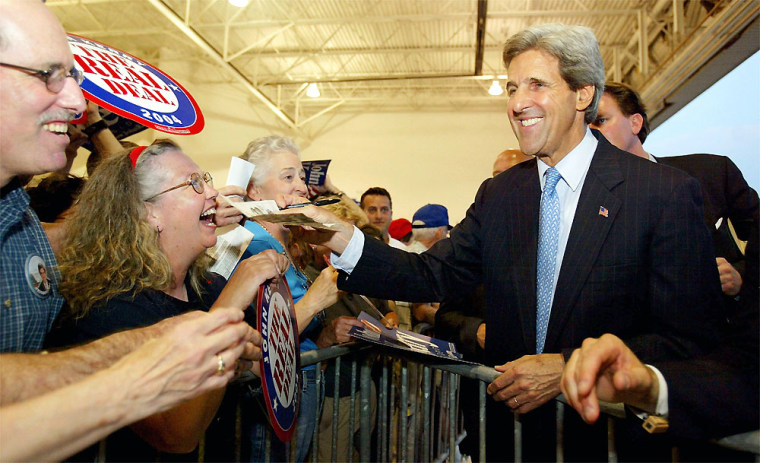Democrat John Kerry said Wednesday he’s open to nominating anti-abortion judges as long as that doesn’t lead to the Supreme Court overturning the landmark 1973 ruling that made abortion legal.
Kerry, the presumptive nominee of a party that overwhelmingly favors a woman’s right to abortion, struck a moderate note as he lashed out at one of the high court’s most conservative justices, telling The Associated Press he regrets his 1986 vote to confirm Antonin Scalia.
“If you’re looking for me to admit that I made a mistake in my years in the Senate, there you go — there’s one,” said the four-term Massachusetts senator.
In a 60-minute interview with AP reporters and editors, Kerry covered a range of issues, from the economy, gun rights and his differences with President Bush to Mideast violence and the mounting death toll in Iraq.
If elected, Kerry promised that virtually all U.S. combat troops will be out of Iraq — away from “the death zone” — by the end of his first term.
He grudgingly gave Bush and the Republican-controlled Congress credit for the creation of 900,000 jobs this year, echoed the administration’s views on the Israeli-Palestinian conflict and seconded Bush’s decision to nominate Alan Greenspan for a fifth term as chairman of the Federal Reserve.
Harsh words for Bush
But those were fleeting passes at bipartisanship as Kerry spent the bulk of the session criticizing Bush and fleshing out his own political vision, which critics have called muddled.
“I’ve heard some people say, well, what’s the message? What’s he doing? The message is clear, folks: We’re going to make America stronger at home by being fiscally responsible, investing in health care and education, becoming energy independent, and we’re going to make ourselves stronger in the world by restoring America’s respect and influence with a better foreign policy. It’s that simple.”
Kerry said Bush has damaged relations with allies to the point that only a new president can repair them. The problem is evident in Iraq, said the decorated Vietnam War veteran who promised to avert a quagmire.
“It will not be like Vietnam,” Kerry said. “I will get our troops home from Iraq with honor and with the interests of our country properly protected.”
How soon? “It will not take long to do what is necessary. I’m not going to give you a specific date, but I’ll tell you that I have a plan and I will put that plan in place.” Republican Richard M. Nixon used similar language during the 1968 presidential race, but the war dragged on for years after his election.
Saying his goal would be achieved in his first term, Kerry explained, “Look, you may have some deployments of people for a long period of time in the Middle East depending on what the overall approach to the Middle East is. I’m not going to tell you we won’t shift deployments from one place to another, but we’re not going to be engaged in an active kind of death zone the way we are today.”
Discussing the Supreme Court and abortion, Kerry ventured into one of the nation’s most sensitive political subjects at the risk of alienating powerful Democratic interests groups fighting to maintain abortion rights secured in the Roe v. Wade case.
Court observers contend the justices are split 5-4 on the issue, and the next president may be able to help tilt the balance.
Defining good judges
Calling himself a strict constructionist, a phrase Bush has used to describe himself, Kerry paraphrased former Supreme Court Justice Potter Stewart and said: “A good justice is somebody that when you read their decisions you can’t tell if they are Republican or Democratic or liberal or conservative, a Christian or a Jew, a Muslim, male or female. You just know you’re reading a good judicial opinion.”
Stewart, an Eisenhower appointee, served from 1958-1981.
Kerry said he has voted in favor of “any number of judges who are pro-life or pro-something else that I may not agree with,” some of whom were nominated by Republican presidents. “But I’m going to make sure we uphold what I believe are Constitutional rights and I’m not going to pick somebody who’s going to undermine those rights.”
“Do they have to agree with me on everything? No,” Kerry said. Asked if they must agree with his abortion-rights views, he quickly added, “I will not appoint somebody with a 5-4 Court who’s about to undue Roe v. Wade. I’ve said that before.”
“But that doesn’t mean that if that’s not the balance of the court I wouldn’t be prepared ultimately to appoint somebody to some court who has a different point of view. I’ve already voted for people like that. I voted for Judge Scalia.”
Presidents nominate a wide variety of federal judges, including the Supreme Court.
Asked if he regretted that vote, Kerry said, “Yes. Given what he has done on a number of cases.” Kerry said he didn’t see at the time “such a level of ideology and partisanship” he now sees in Scalia.
Kerry also said:
- Bush and the GOP-led Congress deserve “some credit” for jobs created this year, but he said the new employment doesn’t pay nearly as much as jobs lost overseas.
- Israel has a right to defend itself with a “proper measure of restraint.” Bush has used a similar two-sided approach to the issue.
- In Iraq and Guantanamo Bay, the United States should live by the tenets of the Geneva Conventions — even in instances when the treaty may not technically apply.
- He would defend the Second Amendment’s protections for gun owners.
- He has no intention of asking pro-Democratic groups spending millions in unlimited donations in the presidential election to stay out of the race.
